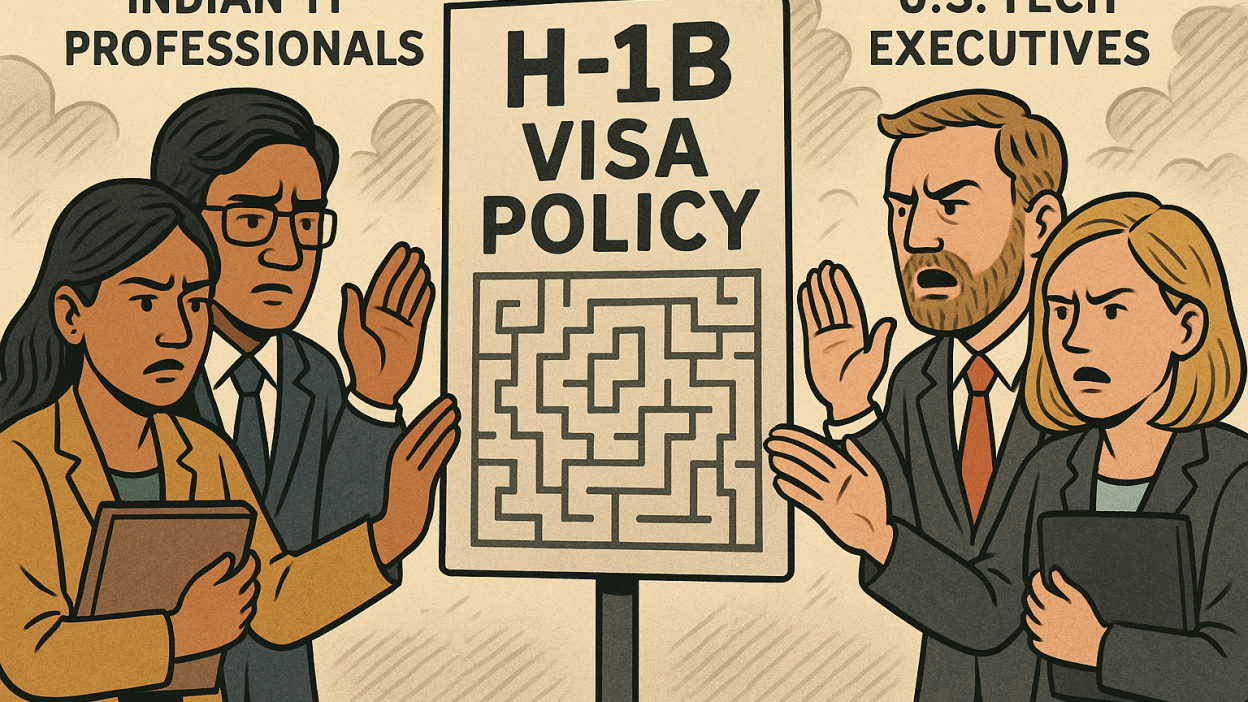Trump’s H-1B Fee Move Reflects Political Loyalty, Beyond Visa Policy
The H-1B visa program has long been a lifeline for the U.S. technology sector, enabling companies to hire specialized talent from abroad. Recently, the Trump administration’s decision to revise H-1B visa fees has sparked controversy—not merely as a fiscal or immigration policy adjustment, but as a signal of political fealty. By selectively increasing costs for companies and applicants, the move raises questions about whether compliance and loyalty to governmental priorities might play as significant a role as skill and innovation in determining who gains access to U.S. talent pipelines.
For Indian IT firms, startups, and multinational corporations, this change is not just an operational concern; it carries broader societal and economic implications. Thousands of tech professionals depend on H-1B visas for employment opportunities, family stability, and career advancement. Higher fees and stricter scrutiny could affect not only migration patterns but also the competitive dynamics of the global technology sector.
More than a policy tweak, this move illustrates the intersection of economics, law, and politics. By embedding considerations of loyalty into visa decisions, the administration signals that alignment with national or political priorities can influence outcomes as much as technical qualifications. This article explores the multifaceted impact of the revised H-1B fees, examining their implications for businesses, workers, and the broader economy, while analyzing how political loyalty increasingly intersects with immigration policy.
The H-1B Visa Program
The H-1B visa program allows U.S. companies to employ foreign professionals in specialty occupations requiring advanced degrees or technical expertise. Historically, it has been instrumental in filling talent gaps in fields such as software development, engineering, healthcare, and research. Approximately 85% of H-1B visas are issued to Indian nationals, reflecting both the global demand for IT skills and India’s dominance in producing qualified professionals.
Originally designed as an economic and skills-based instrument, the H-1B program has evolved into a highly politicized tool. Fee adjustments, caps, and compliance measures are now intertwined with domestic policy debates around immigration, labor markets, and national security. The Trump-era fee revisions illustrate this trend: they increase financial burdens on companies while also emphasizing adherence to administrative priorities, subtly signaling that political alignment can affect eligibility.
This human dimension is critical. For visa applicants, these policies determine not just employment but family stability, career progression, and long-term life planning. For companies, fees and compliance rules influence hiring strategies, project costs, and global competitiveness. By introducing both fiscal and political considerations, the revised H-1B fees exemplify the complex intersection of governance, economics, and human impact.
Political Loyalty and Economic Signaling
Analysts argue that Trump’s H-1B fee changes extend beyond standard immigration administration. By tying higher costs and stricter scrutiny to firms’ size, sector, and sometimes their perceived political alignment, the policy communicates a broader message: loyalty to the administration and alignment with U.S. economic priorities matter.
For example, larger IT outsourcing firms may face higher fees or additional documentation requirements compared to domestic-focused or politically aligned startups. While ostensibly aimed at protecting U.S. workers, the policy also operates as a subtle lever of influence, signaling to companies that compliance—and perhaps tacit support—can shape outcomes.
From a human perspective, this creates uncertainty for employees and their families. Skilled professionals from countries like India, who often invest years in education and career preparation, now face an added layer of unpredictability. Even top-performing employees may encounter obstacles unrelated to merit, underscoring the profound societal impact of policy decisions that merge economics with political signaling.
Economic Impact on Indian IT Firms
Indian IT companies dominate the U.S. outsourcing market, with firms like TCS, Infosys, and Wipro heavily reliant on H-1B talent. Higher visa fees and stricter compliance increase operational costs, affect project profitability, and potentially slow hiring timelines.
-
Cost Implications: Fee hikes translate into millions in additional expenses annually for major IT firms, which can impact investment in innovation or expansion.
-
Strategic Shifts: Some companies may reconsider sending employees to the U.S., opting instead for remote delivery models or investing in domestic markets abroad.
-
Competitive Dynamics: Smaller or politically favored companies may gain an advantage if fees or scrutiny disproportionately impact larger, global firms.
Case studies indicate that fee adjustments can influence corporate decision-making significantly. For instance, Infosys reported adjustments to hiring plans and internal budgeting strategies following previous fee revisions. The human impact extends to thousands of employees whose career opportunities are directly linked to U.S. assignments, creating ripple effects on income, skills development, and family stability.
Impact on Talent Migration and Workforce Development
Higher H-1B fees may discourage mid-sized companies from sponsoring foreign workers, potentially limiting the inflow of specialized talent. This can have broader consequences:
-
Brain Drain vs. Brain Gain: While the U.S. may continue attracting top talent, smaller firms’ reduced participation could limit opportunities for skilled professionals.
-
Remote Work Solutions: Companies may increasingly rely on remote delivery models, shifting talent utilization away from U.S.-based employment.
-
Domestic Talent Development: Fee hikes could incentivize firms to invest more in domestic training programs, potentially benefiting U.S. workers while affecting global mobility.
The societal perspective is multifaceted. Skilled foreign workers contribute not only to technological innovation but also to cultural exchange, diversity, and the broader economic ecosystem. Policies that tie access to political loyalty rather than solely to merit risk undermining these benefits.
Compliance and Corporate Response
Several Indian IT firms have responded strategically to prior H-1B fee increases:
-
TCS and Infosys: Increased use of offshore delivery centers to mitigate costs, while selectively deploying top talent to U.S. projects.
-
Smaller Startups: Leveraged fee waivers or alternative visa programs to maintain access to U.S. markets.
-
Remote Transition Models: Companies explored remote-first models for U.S. clients, minimizing visa dependency while sustaining project delivery.
These examples highlight the interplay of economics, strategy, and politics. Companies must navigate a complex environment where policy compliance, political signaling, and human capital considerations converge, underscoring the intricate human and societal dimensions of visa policy.
Legal and Ethical Implications
Embedding loyalty considerations into immigration policy raises ethical and legal questions:
-
Meritocracy vs. Political Alignment: Policies may inadvertently prioritize alignment with administration priorities over skill and experience.
-
Equity Concerns: Higher fees and selective scrutiny could disadvantage smaller or foreign-owned firms, impacting global competitiveness.
-
Transparency: Clear, consistent guidelines are necessary to prevent arbitrary decision-making and maintain public trust.
Researchers note that ethical policymaking in immigration should balance national interest with fairness, predictability, and respect for human capital. H-1B fee adjustments that signal loyalty blur this line, making it essential for policymakers to consider both human and economic impacts.
Long-Term Implications for the U.S. Tech Ecosystem
If H-1B policies continue to embed political loyalty as a criterion, long-term effects may include:
-
Talent Realignment: Skilled workers may seek more predictable destinations, shifting global tech migration patterns.
-
Corporate Strategy Evolution: Firms may increasingly weigh political risk alongside operational and financial metrics when planning U.S. engagements.
-
Innovation Impact: Restrictions on talent mobility could slow technological advancement, affecting U.S. global competitiveness.
The societal stakes are clear: visa policy affects not only corporate profitability but also individual livelihoods, family stability, and the broader innovation ecosystem. Balancing national interest with human and economic considerations remains critical.
Trump’s H-1B fee revisions illustrate that immigration policy is no longer purely an economic or legal instrument—it has become a tool of political signaling. By embedding considerations of loyalty alongside merit and skill, the administration has reshaped the calculus for companies and professionals navigating the U.S. tech ecosystem.
The impact is multifaceted: Indian IT firms face higher operational costs and strategic adjustments, skilled professionals encounter uncertainty in career and life planning, and the broader innovation ecosystem risks disruption. Yet, these changes also highlight opportunities: firms may innovate with remote models, invest in domestic talent development, and adapt strategies to align with shifting policy landscapes.
Ultimately, this episode underscores the human dimension of policy decisions. Visas are not abstract instruments—they shape careers, families, and economies. As the H-1B program evolves, balancing political priorities with merit, fairness, and human impact will be essential to maintaining U.S. competitiveness and the vitality of the global tech workforce.
FAQs
Q1. What is the H-1B visa program?
It allows U.S. companies to hire foreign professionals in specialty occupations requiring advanced degrees.
Q2. How do fee changes affect Indian IT firms?
Higher fees increase operational costs, influence hiring strategies, and may encourage offshore delivery models.
Q3. Is political loyalty officially a criterion for H-1B approvals?
Not explicitly, but revised fees and scrutiny may indirectly favor firms aligned with administrative priorities.
Q4. What are the societal implications?
Impact on skilled workers’ careers, family stability, and global mobility of talent.
Q5. How can companies mitigate these challenges?
Strategic workforce planning, remote work adoption, and investment in domestic talent development.
Q6. Does this affect U.S. competitiveness in tech?
Potentially, as talent mobility and innovation could be impacted if policies overly restrict access.
Stay informed on global tech migration, policy changes, and workforce trends. Subscribe to our newsletter for expert insights on H-1B policy, immigration, and the U.S. tech ecosystem.
Note: Logos and brand names are the property of their respective owners. This image is for illustrative purposes only and does not imply endorsement by the mentioned companies.



